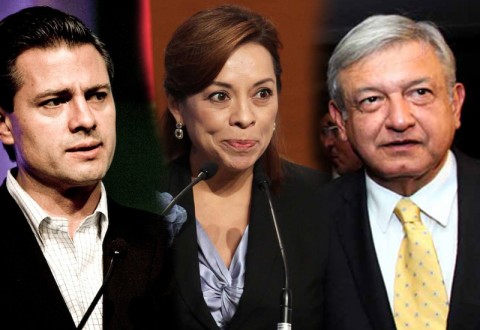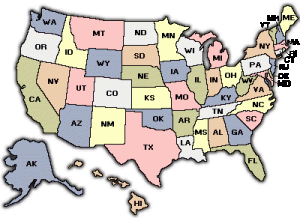THE HISPANIC BLOG IS THE LATEST HISPANIC NEWS BY JESSICA MARIE GUTIERREZ
Meet the Candidates: Enrique Peña Nieto, the Mexican presidential candidate for the Institutional Revolutionary Party (PRI), Josefina Vazquez Mota, presidential candidate for the ruling National Action Party (PAN), Andres Manuel Lopez Obrador, presidential candidate for the Party of the Democratic Revolution (PRD)
What will the change in “leadership” do for Mexico?
Will there be dirty politics in Mexico’s Presidential Election?
- An employee of the Electoral Federal Institute (IFE) classifies and sorts votes casted by Mexicans living outside Mexico, on June 29, in Mexico city. Mexico will hold presidential elections July 1. Ronaldo Schemidt/AFP/GettyImages
Sunday’s presidential election represents a difficult test for Mexico’s wobbly democracy: Can it hold a fraud-free national vote in the midst of a raging drug war? The country’s top election official conceded recently that violence in parts of the country prevented election officials from completing some preparations. But the official, Leonardo Valdes, insisted that safeguards are firmly in place to prevent the kind of brazen electoral fraud once notorious in Mexico. And, he said, most of the strong-arming, threats and payoffs by drug traffickers remain limited to local politics and less influential in the national race.
- June 10, 2012 A student from the anti-PRI youth opposition movement “Yo soy132” (“I am 132”) holds up a placard before the presidential candidates’ televised debate in Guadalajara. Tomas Bravo/Reuters
“Mexican presidential elections today are armored against fraud,” Valdes said. More than 1 million trained poll workers will be deployed in 143,151 voting stations, nearly all of which will also have monitors from at least three political parties. The specter of fraud looms especially large this year because the party that perfected the buying of votes and rigging of elections, the Institutional Revolutionary Party (PRI), is favored to return to the presidency with its telegenic candidate Enrique Peña Nieto. The PRI held on to power for seven decades through repression, coercion and co-opting opponents, until it was ousted in 2000. It is staging a hard-fought comeback.
- “It will be the biggest march of your life” a comrade of La Izquierda Socialista (Marxist wing of Morena) said Wednesday, 27th of June, when leftist Andres Manuel Lopez Obrador (AMLO), like other candidates in the coming Mexican presidential elections, was to hold his final election rally or ‘cierre de campaña’ (campaign closing) as it is called here.
One of the largest demonstrations in the history of Mexico
AMLO directly mentioned the “I am 132” movement and the role it has played in energizing the population to defeat the bourgeois candidates. Also, when mentioning the organizations that back him he put an emphasis on MORENA (“Movement for National Regeneration), which is not an ‘official’ party yet but acts as a mass movement of more than 3 million members, many of whom youth and students, who are organized in brigades and committees all across the country. Tellingly, the mention of MORENA also got the loudest applause, possibly to the chagrin of some of the PRD bureaucrats present.
Despite tighter oversight and strengthened laws to ensure clean elections, analysts say Mexico remains vulnerable to many of the dirty tricks that flourished during PRI rule. Voter credentials make it easier to confirm a person’s identity, for example, but candidates and parties have turned to handing out discount cards to win influence with voters. Taking a page from the PRI’s old playbook, all three parties now bus voters to the polls on election day, giving them meals or other perks along the way. Another reported ploy is for voters to take a picture of their marked ballot with a cellphone and later show it to party operatives in return for cash.
“We continue to have elections that have serious problems in terms of legality, equality of access,” said John M. Ackerman, a law professor in Mexico City who has written about the country’s election laws.
While the PRI has opposed reform, Peña Nieto has run a campaign openly calling for structural changes in energy, tax, social security, education, labor etc, which is promising according to Fuente. “For others, though, a resounding victory by the PRI conjures up images of a return to one party-rule in Mexico, with the centralism and cronyism that characterized much of the PRI’s 70 year hold on power until 2000.” photo source: Danny Aguilar/Getty Images
Even before the first ballot was cast, leftist candidate Andres Manuel Lopez Obrador, Peña Nieto’s closest rival, warned of a fraud that would rob him “once again,” as he puts it, of the presidency.
To see how bad political posturing can get, rewind to 2006, when Lopez Obrador lost to Felipe Calderon by less than 1% of the vote. Lopez Obrador refused to recognize Calderon’s victory, unleashing a wave of paralyzing street protests. The following year, Congress passed electoral reforms that regulate air time by parties, prohibit attack ads and shorten to 90 days the amount of time presidential candidates may campaign. A big concern among Lopez Obrador supporters is the PRI’s strong grass-roots presence across most of Mexico’s 31 states and long history of vote-tampering during its rule. Leftists worry that the same well-oiled machinery could be used to inflate the vote on Peña Nieto’s behalf. But the odds for post-election controversy could hinge on the vote tally. A large margin would weaken potential charges of fraud, one reason why the Peña Nieto campaign hopes polls suggesting a blowout prove accurate.
photo source: The grandmother of police officer Jose Ramirez grieves over his body after he was killed by unidentified gunmen while on patrol in Las Joyas neighborhood of Acapulco, Mexico, in July 2010. Ramirez’s grandmother did not give her name, citing security reasons. Three other officers in the vehicle were also killed in the attack. AP/Bernardino Hernandez
Despite a drug war that has claimed more than 50,000 lives in almost six years, and traffickers’ penetration of many levels of Mexican life, most experts agree that the fertile field for narco-influence in politics remains at the local level. Traffickers are keen to control local police forces and city halls so that they can produce, sell and transport their drugs unimpeded. In elections in the state of Michoacan late last year, for example, cartels published ads in newspapers and made phone calls to regional officials with instructions on how to vote. In 2010, the ultra-violent city of Ciudad Juarez elected a mayor alleged to have had ties to a cartel, while in the state of Sinaloa, historic heartland of Mexican drug-trafficking, the compadre of one of the country’s top drug lords only narrowly lost the race for governor.
Starting in the mid-1990’s, different drug gangs increasingly became more violent, fighting to be on top, and gain more control and territory. After Gallardo was arrested, his lieutenant, Joaquin Guzman, started a war with other drug-lords that has since claimed over 50,000 lives.(Kellner) Little was done about the violence, and for a while, there were not even stories in the papers about these horrific and gruesome murders.
“We have had to recognize, especially locally, the presence and actions of criminal groups in the realm of elections,” Interior Minister Alejandro Poire said last week. “We are acting to prevent it … to guarantee that citizens be able to go out and vote in peace…. We cannot call this an election of fear.” The election has forced Mexicans to ponder the progress of democracy in their nation. Most celebrated the defeat of the authoritarian PRI in 2000 and welcomed a new party, Calderon’s National Action Party (PAN). But 12 years later, many feel, rightly or wrongly, that the experiment failed. Fundamental reforms of the educational system or of the monopolies that dominate and strangle the economy were not undertaken. Instead, Mexicans are saddled with a bloody war, a gnawing sense of terror and insecurity, and, now, the return of the very party they ousted.
“Millions of Mexican people thought that, almost magically, alternation [one party handing off to another] would bring about profound changes in Mexico,” said Alfonso Zarate, a political analyst in Mexico City. But a PRI victory, he said, “would mean the censure and disapproval of the PAN governments. It means disillusionment.” At the same time, the flow of power to the state governors since the centralized PRI regime was ousted has created powerful fiefdoms where governors can rule without the checks and balances of a healthy democracy. “On the state level, we have gone backward,” Zarate said.
May 13, 2012 Josefina Vazquez Mota, presidential candidate for the ruling National Action Party (PAN), waves Mexico’s flag during a rally in Veracruz. Oscar Martinez/Reuters
As even more mature democracies have shown, an open multi-party system does not necessarily produce stellar candidates. Numerous Mexicans have expressed near-existential dismay over the choices they have in this election; they chafe at the prospect of the PRI’s return, can’t stomach more of the current, discredited government, and see Lopez Obrador as an unreformed erratic. “This is a democratic process,” Mexican historian Enrique Krauze said. But “the democratic voter — the voter who in Mexico believes deeply in democracy — has a difficult choice to make.”
Read More: LA Times
SUBSCRIBE to The Hispanic Blog to stay on top of the latest latino news, politics and entertainment!
Don’t be shy SUBSCRIBE – COMMENT – LIKE ME -CIRCLE ME AND FOLLOW ME
If you have any questions, concerns or simply would like to get a quote on my Marketing, Public Relations, Social Media and/or Events services, please feel free to contact me.
God Bless and make it a fabulous day!
powered by Influential Access – “Transforming the Ordinary to EXTRAordinary!” – CEO – Jessica Marie Gutierrez – Creator of The Hispanic Blog #thehispanicblog
















Leave a comment